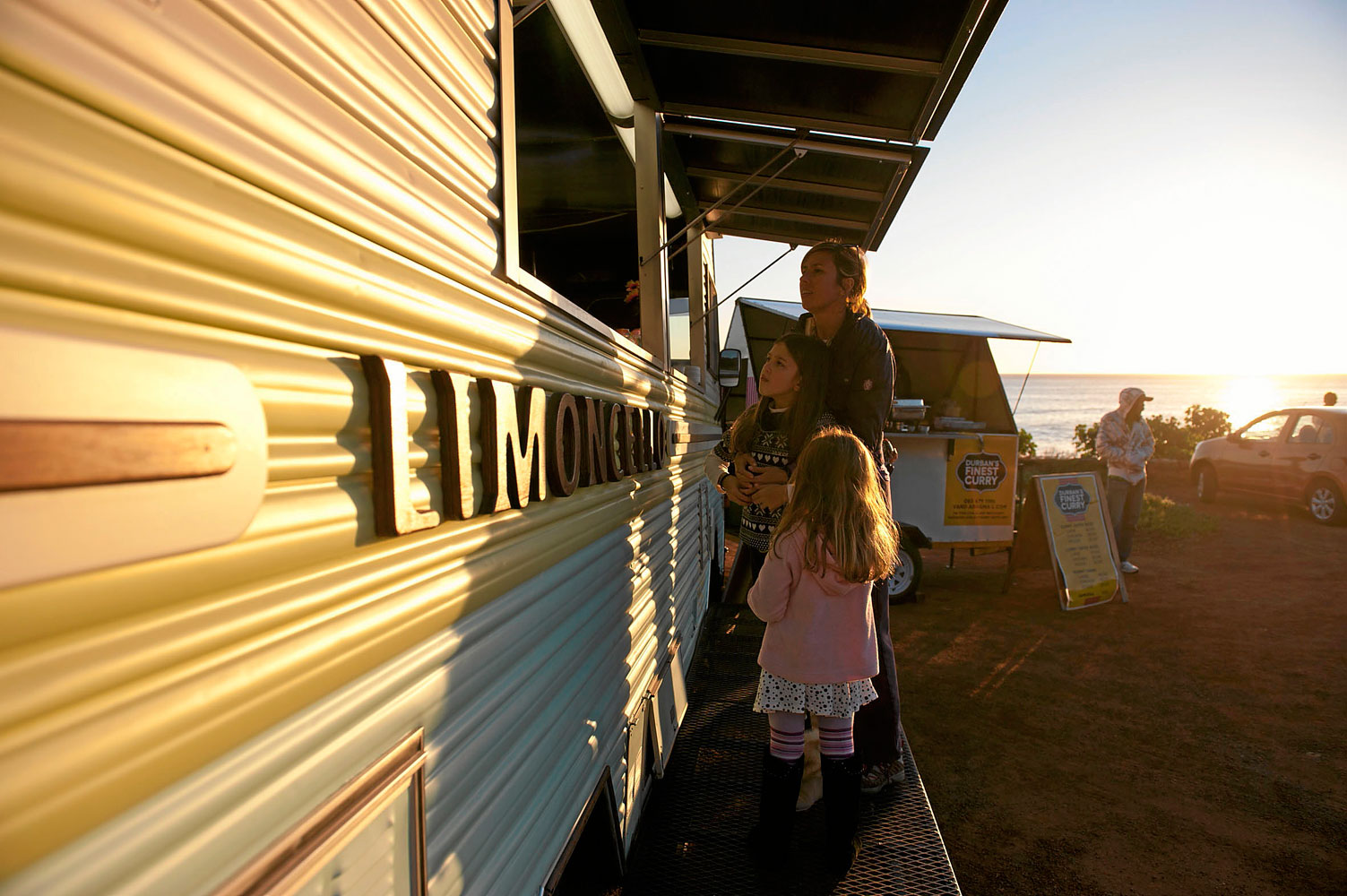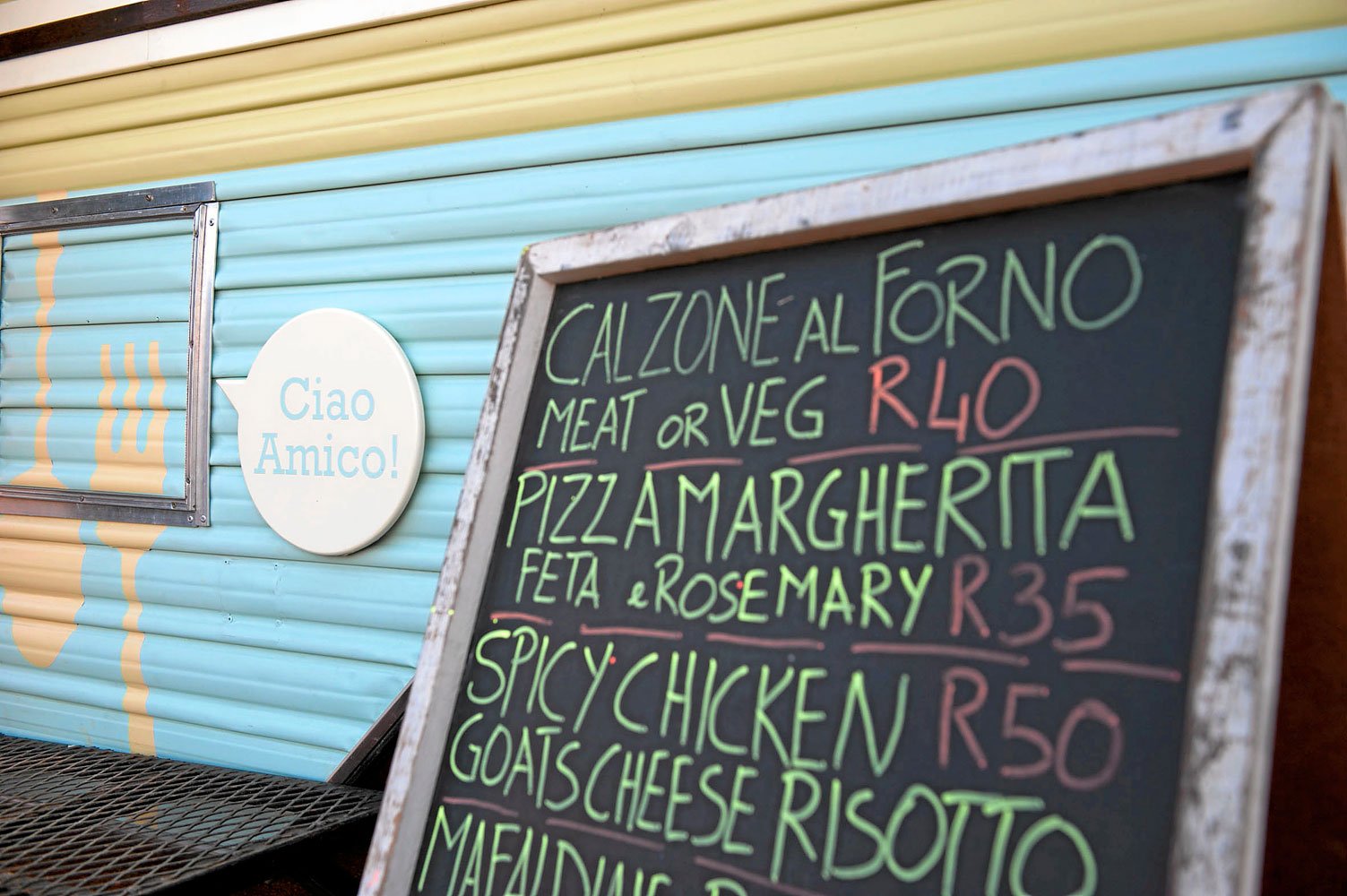Customers can choose from the gourmet meals served from the food trucks.
"Boungiorno truckers we are loading up for Oudekraal Market will post the menu soon #yellowtailpanini #risotto #calzone and more."
The tweet comes through just after 9am on Wednesday. It is one of those summer days in the middle of winter in the Cape that is one of the locals' best-kept secrets. But good weather and Wednesdays are now synonymous with another secret that is just starting to bubble to the surface of Twitter's hashtag ocean.
Drive out towards Oudekraal from Camps Bay on a sunny Wednesday and about halfway you will find a lapa of vintage-styled trucks and caravans. The giraffe installation of the local curio dealers somewhat camouflages them, but know that if you reach the Twelve Apostles, you have gone too far. Basically, look out for the giraffes.
Members of this pop-up outdoor food court include Durban's Finest Curries, Lady Bonin's Tea Parlour, the Soft Machine and, the tweeter in question, the Limoncello truck. You know when the rest of the country is frothing at the mouth about not getting Wednesday Steers' burgers (or, as Cartman would say in South Park, Asperger's), Capetonians are at the food-truck circle near Oudekraal.
Not to say that the food is cheap and nasty. On the contrary. Inspired by the food-truck movement that has exploded in the United States over the past few years, it is gourmet.
Limoncello serves fresh Nepalese-inspired seafood fare and that morning's fish market determines its menu. For Soft Machine, trendy foraging West Coast chef Kobus van der Merwe has developed a bespoke range of soft-serve ice creams with flavours including moerkoffie and melktert. Follow this with a soul-soothing fair-trade, organic tea-drinking experience with Lady Bonin. And if you are hankering after an authentic Durban curry or bunny chow, you have come to the right pit stop.
"When we go to Oudekraal I just cook and look out on the sea. What a pleasure," beams Luca Castiglione, owner and chef of Limoncello. Castiglione is excited about the opportunities that food trucks present, having seen how the movement has taken off in the US.
He has registered the trademark Cape Town Food Trucks and for him winter is about ironing out all the hiccups and getting the city on board to give them designated areas and trade permits. Once the weather becomes more reliable and the tourists start pouring in at the end of the year, he is hoping to have a fleet of trucks, each run and branded by its own restaurateur.
Although food trucks are not a new concept, the evolution went from "roach coach" to taco trucks and quick-hit upmarket lunch food on wheels and, finally, in 2008 in Los Angeles, to reality-TV shows based on celeb-chef food trucks.

Widely credited as being the first of this new gourmet generation of food truckers is Mark Manguera, an American Filipino who married into a Korean family, and was inspired to combine Korean barbecue with tacos. Roping in family and friends, both in the kitchen and on social media, the Kogi Korean BBQ taco truck was born and quickly went viral. Now he owns a fleet of five trucks and has made history by being the first food truck to win major culinary awards. His dedicated foodie fans keep an eye on his location and menu through Twitter. And his success has catapulted food trucks into gourmet stardom.
"With a truck you go to the people but you also go to different locations every day. You're not stuck in the kitchen," said Castiglione, who is hoping to expand and diversify his existing 12-year-old brand, which has been built up through his family-driven neighbourhood restaurant in Gardens. Completed in March, the Limoncello truck goes beyond a retro exterior to house a complete restaurant kitchen with which he can cater for up to 300 people. The first thing he does when he parks is fire up the oven to bake paninis from scratch.
"Catering at killarny for ferrari track day looking forward to ride on a 458 #fast @F1sasha," reads a recent Friday tweet. Saturday he announced his location at the Old Biscuit Mill in Woodstock and on Sunday he tweeted from the Blaauwklippen Market in Stellenbosch.
That Manguera's taco truck should spark a continent-wide movement is a confluence of contemporary social innovations. The fact that technology website Mashable has extensive coverage of the history of food trucks should be a clue: in 2008, not only did Twitter announce its first million followers, but the Apple iPhone, launched the previous year, had also kick-started the smartphone revolution that will one day result in touch screens being implanted into our palms.
Also in 2008, the word "locavore" went mainstream, after the Oxford Dictionary called it the word of the year in 2007. This is when phrases such as food miles, garden-to-fork, food desert and weekday vegetarian started entering the lexicon of food porn.
Conscientious and ethical eaters were seeking alternatives to the deep-fried, factory farm-flavoured convenience food.
But what probably really put the movement on wheels was the economic crash of 2008. Not only did it make it harder for young entrepreneurs to find investors for formal businesses, consumers also started seeking more affordable food options. It was about the same time that pop-up restaurants and shops also became le mode. The mentality has persisted with bumper stickers such as "temporary is the new permanent".
"Running a restaurant is very difficult in that it's not just buying and preparing the food, but a hell of a lot of things that go around it such as staff, electricity, gas and this and that. Not to mention getting the customers to come to you, whereas with the truck you only have it for the day, you know where you're going and what you're going to sell. You buy what you need for the day, you go there, sell it for cash and come home, clean your vehicle," says Castiglione. "So it's almost like a daily job as opposed to a restaurant that has to be open every day."
Jessica Bonin, who launched her caravan in 2010 and was the first South African manifestation of the snowballing international trend, exemplifies what it means for a young entrepreneur to be able to run a business on wheels that can simply be locked up in a garage when out of service.
"I initially wanted to open a tea-room, but due to a lack of finances had to simplify my idea," said Bonin. "The caravan was not only affordable, but allowed me to bring a new concept – takeaway tea – to a nonexistent market and, in that, create a demand."
Having garnered a cult following simply popping up at various markets across the Western Cape and turning tea into more of an experience than simply a cup, Bonin's first success came when she started to sell packaged tea as a product to delis and health stores. Now she is launching her first brick-and-mortar tearoom at the newly renovated Woodstock Industrial Centre, which she said is going to be just as one-of-a-kind as the caravan.
"The caravan has allowed me to change people's perceptions of daily tea drinking by adapting age-old brewing methods to fit in with a modern lifestyle. The caravan has helped remove tea's exclusivity and revived its purpose," Bonin said.
Invin Vandiar, who was the owner of the Vudu Lounge nightclub on Bree Street for 15 years, has started up Durban's Finest Curries with a simple onboard kitchen, doing most of the cooking in his kitchen at home.
"I can now finally fulfil my passion of wanting to cook and bring my Durban culture to Cape Town," he says.
Meanwhile, the Soft Machine started with the product. Van der Merwe developed a natural soft serve with no artificial flavourings or preservatives that uses seasonal ingredients. Unable to find a suitable shop, he and Donald Swanepoel decided to go back to the roots and serve it from a van.
Featuring a trendoid upgrade from most South Africans' childhood memories of neighbourhood ice cream trucks, the van's design was based on work by illustration studio Made by Radio. Marc Nicolson and Lyall Sprong of Thingking brought it to life and it has already been featured on a few international style blogs.

Swanepoel, who owns the truck, is also the owner of Cow Africa, which claims to be the only creative agency in South Africa that specialises in experiential, guerrilla and viral marketing.
"I think food trucks will become extremely popular in South Africa," says Swanepoel. "Besides these four in Cape Town, more people have spoken to me about starting some up. At Cow we are in the process of developing some for other clients. But there are a few things that are holding things back at the moment. Trading zones in the city, for instance, are very restrictive. The council will have to see the potential and move quickly so as to not stifle the growth of the movement. Just like the markets, food trucks will bring real quality and creativity into the cities."
But according to Sam Kelly, Castiglione's business partner, they are already in talks with the City of Cape Town about issuing permits, and the "council appreciates the value we could bring to tourism and the economy. Food trucks are cheaper to set up than restaurants and they're greener."
Once official permission comes through, one can only hope that a fleet of creative food trucks is realised and the proliferation extends beyond the lifestyle class of Cape Town into some of its less advantaged food deserts. Food trucks in the Netherlands, for instance, have seen chefs collaborate with grocery shops to use fresh produce otherwise binned on the sell-by date.
Freeing up the movement of the trucks around the city could mean yellow-tail paninis served on the Grand Parade one day and in front of the courts the next. Swanepoel's vision is for Ice Cream Sundaze in Gugulethu with soft serve, DJ sets and burgers from Clarke's.
It is just a snowball away. As the Soft Machine tweeted on Thursday, only two months after the first Oudekraal gathering: "Sold out on both ice-cream flavours yesterday! sorry to all those who came down and could not satisfy that soft-serve craving … next time just get there a little earlier :)"